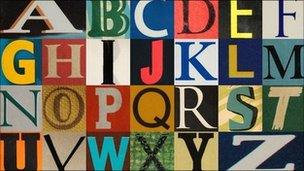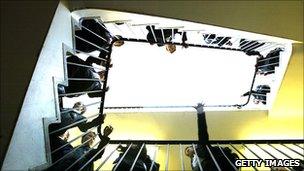One in 11 boys leaves primary school 'unable to read'
- Published

One in 11 boys in England - one in seven in some areas - starts secondary school with, at best, the reading skills of an average seven-year-old.
According to data obtained by the BBC's Today programme, 9% of 11-year-old boys fell well below expected standards.
But in Nottingham that proportion was 15% and the situation was only marginally better in Derby, Manchester, Rotherham and Telford.
The government is bringing in a reading check for six-year-olds.
Education experts said it was hard for children struggling at age 11 ever to catch up.
Just before leaving primary school, children take a reading test as part of their Sats examinations. They are then marked into categories, level 4 being the expected standard.
According to the Department for Education statistics, the proportion of children gaining that grade has increased dramatically over the last 15 years, from 49% to 81%.
But this masks a stubborn problem at the lower end of the school spectrum. In 1995, the proportion of 11-year-olds getting Level 2 or below in English - the standard expected of a seven-year-old - was 7%. In 2010, it had fallen only to 5%.
The figures show the problem is worse for boys. Overall in England, 9% of them - about 18,000 - achieved a maximum of level 2 in reading.
In some local authority areas that proportion was far higher: 15% in Nottingham, 14% in Barking and Dagenham, Telford and the Wrekin, Rotherham, Manchester and Derby.
Dylan William, professor of education at the Institute of Education, said it could be very hard for children struggling with their reading to catch up.

Secondary school teachers are not used to teaching children who cannot read properly, because the syllabus is based on textbooks.
Prof William said it had never been more important to be able to read to a decent standard.
He explained: "Twenty years ago, you got a lot of information from television. Now it's the internet - you have to be more literate."
But Prof William says that will not, in itself, tackle the issue: "Identification is not the problem. If you ask the teachers of those boys who are struggling at 11... they probably were identified as having problems at seven.
"The problem is finding the resources to deal with it."
He says there are solutions, known as "reading recovery" methods. They include intensive tuition and much smaller class sizes.
Education Secretary Michael Gove: "We haven’t had the focus we need on raising attainment"
But these methods tended to be expensive, he said.
And the government has ended struggling pupils' automatic right to one-to-one catch up help, pledged across England by the previous Labour government.
Education Secretary Michael Gove is introducing a national reading test for all six-year-olds in England to identify those with problems.
He said: "I believe we need to make a series of changes so that children can learn to read so they can go on to read to learn."
This included targeting extra resources to disadvantaged pupils in schools, training teachers in the use of synthetic phonics and targeting extra help to those struggling.
Mike Welsh, national president of the National Association of Head Teachers, said: "There's nothing new here. We know that part of underachievement is due to children with very significant special educational needs where progress can be much slower.
"Many primary head teachers, particularly those serving disadvantaged communities under social-economic challenge, regard the raising of boys' attainment, particularly in writing and reading, as one of their highest priorities.
"Schools reflect society. What we want is school and home to work together, where children are actually listened to at home, in terms of reading, and obviously parents read to them."
Referring to the coalition government's plans to spend more on struggling students, Mr Welsh said: "At the moment the pupil premium has been set at £430 which is too low to have the specialist teaching [needed].
"We are hoping that over the next few years it is going to rise so we can actually provide that."
- Published17 December 2010
- Published11 November 2010